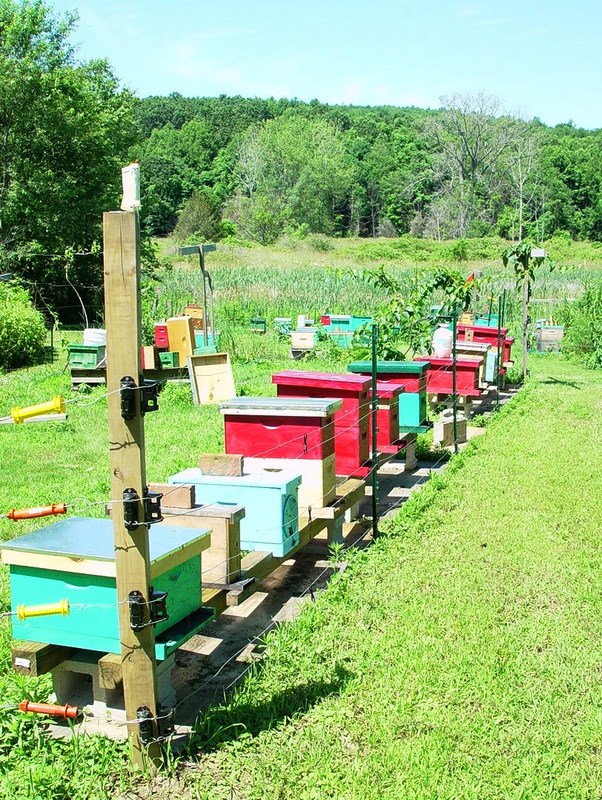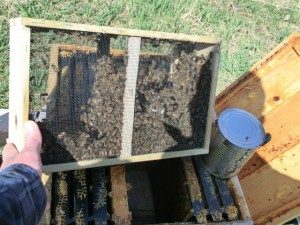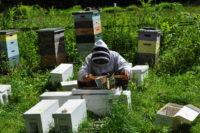
2025 Workshops and Bee Classes
REGISTRATION: Please send your email to warmcolors@verizon.net and request a class form. Dan will send the form as an attachment by reply email.
2025 marks our 25th season teaching new and experienced beekeeping programs. We have introduced hundreds of new beekeepers to honeybees and the management it takes to keep bees and produce honey. This year we are taking a new approach by adding all our workshops to the Beginning in Beekeeping class, and re-thinking our checklist of priorities: starting colonies, producing honey, and providing health management techniques – proven, not experimental or alternative.
Dan has focused on providing the basics to new beekeepers. Getting the hive started, feeding, and growing the colony, using limited treatment. Learning the basics no longer provides the foundation for new beekeepers to succeed. 2025 will include the basic prerequisites needed to start a colony and include management skills that help slow swarming, increase honey production, and focus attention on wintering techniques. Successfully getting bees through a New England Winter is the final exam.
The classes will provide an understanding of the two seasons a beekeeper manages. The first year is about starting and raising a healthy honeybee colony capable of surviving the winter. Season two is working with a mature colony that can produce surplus honey, be used to increase the number of hives and techniques of swarm prevention.
We have updated the materials used in the workshop series. Our strength has always been the refinement of a proven management system. We can compare many colonies to revise our management – what is working and what is not. We have the benefit of more than fifty years as beekeepers. Twenty-five as commercial beekeepers. Our beekeeping focus is to reduce unnecessary treatments in hives, improve the bees’ natural resistance to mites and disease, and find the best methods for keeping our bees healthy and productive. This is what we can offer our students. Learning to be a skilled bee person is ongoing and no one ever knows everything. Nature is unpredictable, the honeybees adapt, and the beekeeper must keep learning to make changes.
Classes continue to be organized around lectures, handouts, and bee yard demonstrations. Several Zoom meetings have been scheduled for the early presentations. Later classes will include opening hives and reading colony conditions by looking at brood, food reserves, and worker activities.
We sell books at our South Deerfield honey house. These are the references and how-to books we consider accurate and well-written. Many are books written by authors who have visited and taught programs at Warm Colors.
Hands-on experience and management that provides practical outcomes is our focus
It is not required that you keep bees to participate in the workshops. Curiosity, wanting to learn, or taking the classes to consider keeping bees at a future time are good reasons to join us. See if it fits your lifestyle. We reserve bees for class participants that are available to purchase after the first class. Pickup is scheduled for the first week in May.
The complete program is $250. Includes all classes and materials.
1. Starting in Beekeeping #1 (includes four workshops) March 30, 2025, 5:30-7:00 PM – for beginning beekeepers. This will be an online Zoom meeting.
This class is designed for new beekeepers. We focus on the basic tasks in managing a first, and second-year, honeybee colony. Enrollment in this class gives the new beekeeper access to all our workshops. The first session reviews what you will need to get started and introduces you to the behaviors and biology of the honeybee considered essential for successful apiary management.
- Equipment & tools used in beekeeping.
- Criteria for picking a location for bees – requirements & apiary laws.
- How to order bees – the origin of honeybees, package bees, and Nuc colonies.
- Distribute textbooks, DVD, bee, and equipment ordering information.
Cost: This class only including book and handout is $50.00. Complete series of workshops including all seven sessions, Dan’s notes, book, and workshops is $250.
2. Starting in Beekeeping #2 April 13th, 2025, 5:30 – 7:00 PM – for beginning beekeepers. Online Zoom meeting.
This session reviews the monthly tasks, and bee colony dynamics the beekeeper must understand to manage a colony. We will discuss beekeeper tasks, corrective actions to problems and complete the beekeeper’s checklist.
- Seasonal Cycle of Beekeeping Tasks – The month-by-month activity list.
- The big three – Queen, worker population, and honey & pollen reserves.
- How We Predict the future productivity of the hive by evaluating comb, calculating population growth, and early diagnosis of stressors affecting the colony.
- Building a personal management system – information useful for making local decisions. Recordkeeping & knowledge-based planning.
Cost: This program only is $50. It is included if you sign up for the full course.
3. Starting in Beekeeping #3. Beekeeper Tasks and Basics of Colony Management – Sunday April 27th, 5:30 -7:00 PM – Zoom meeting appropriate for all beekeepers.
Topics focus on common tasks and challenges for beekeepers. The class is the second half of Session #2 covering specific procedures in more detail. These include inspecting colonies, diagnosing common diseases, swarm prevention, Queen evaluation, and corrective options to improve colony survival.
- Making Colony Increase – buying bees, splitting colonies, catching swarms.
- Pollination – crops, moving bees, evaluating successful fertilization.
- Honey Production – supering, wildflowers and varietals.
- Managing Hive Maladies – pests & disease. Prevention to avoid losing hives.
Cost: This program alone is $50. Included with full course registration.
4. Installing Nucs, introducing Queens, and the care and feeding of the New Colony. Date TBA on the weekend the bees arrive. Saturday (May) 1 – 3:30 PM. Appropriate for all Beekeepers.
This is scheduled as an outdoor activity at the Warm Colors Apiary, South Deerfield, MA. We will demonstrate setting up Nucs, introduction of Queens, and preferred methods of feeding a colony.
This is a live bee workshop. Please wear protective clothing. If you purchased a Nuc from Warm Colors, you should plan to collect it on this day.
- Picking the best Nuc – questions to ask.
- Checking the Queen – requirements of an excellent queen.
- Setting up the new hive – be ready for your bees.
- Introducing a Queen – steps & checks for Queen acceptance.
- Installing the Nuc – depends on the weather.
- Feeding – feeders, how much, and how long?
- Care for Nucs – tricks of the trade.
(No need to register– this program is free.)

5. Management of Russian Honeybees – Sunday, May 18th, 2025, 1-3:30 PM – appropriate for beginners and review for experienced beekeepers.
A review of spring tasks, including hive evaluation, feeding and prevention of disease. Honey production, swarm prevention and early activities commonly performed during spring and summer. Bring protective clothing for bee yard demonstrations. Handouts included.
- How to grow your colony – proper feeding, adding space, Queen performance.
- Conducting a proper inspection – the importance of recordkeeping and researching tasks.
- Mite sampling, the importance of early detection of disease, honey bee defenses.
- Swarm prevention & control.
- Making colony “splits” and Nucs for apiary expansion.
- Increasing honey production – knowing the plants that produce the nectar flows, honey supering techniques, when to extract the honey harvest.
Cost: Program & handout $50. Included in full course.
6. Queen Rearing for Small Apiaries – July 8th, 2025, 1 – 3:30 PM – appropriate for second-season beekeepers. Beginners are welcome.
We will learn to raise Queens using simple methods available to most beekeepers. Using Queen cells, the Miller method, and forcing emergency Queen rearing will be reviewed. This is for the backyard beekeeper who wants to raise a few Queens from their best colony.
The Queen’s ability to lay eggs, pass desirable behaviors (through her genetics) to workers and drones, make her the most important member of a colony. The beekeeper must be able to evaluate the Queen’s performance and recognize when a Queen must be replaced. We will discuss Queen development, mating & drones, and evaluation by measuring brood comb, and worker behavior.
We will also provide instruction on raising Queens for the small apiary. In the bee yard, we will demonstrate simple techniques to raise daughters from your best performing Queen. The use of Queen cells, creating emergency conditions to stimulate Queen rearing in the colony, and using Nucs to raise a few Queens will be covered.
- Queen care and handling – comb, nurse bees, and nectar.
- Marking queens – age, visual, and genetic lineage.
- Predicting worker populations & swarming.
- What makes an excellent Queen? Genetics, development and drones.
Program, Handout: $65. Included in full course.

7. Fall & Winter Management – Sunday, August 10th, 2025, 1-3:30 PM – appropriate for all levels of beekeeping.
The final exam for beekeepers is preparing hives for winter. This begins in early fall when there is still time to correct problems. Queen evaluation, feeding, and winter food reserves, lack of mites and disease will be explained. Wrapping & insulating hives, locations, and equipment will be discussed. Bring protective clothing for the bee yard. Handout included.
- What does a healthy hive look like?
- Queen, worker population, food reserves and size of the colony.
- Varroa mites & Nosema disease key factors in wintering colonies.
- Thermoregulation in the hive – masters of temperature control.
- External conditions – fencing, windbreaks, sunshine, wrapping & insulating hives.
Cost: Program & Handout $50. Included in full course.